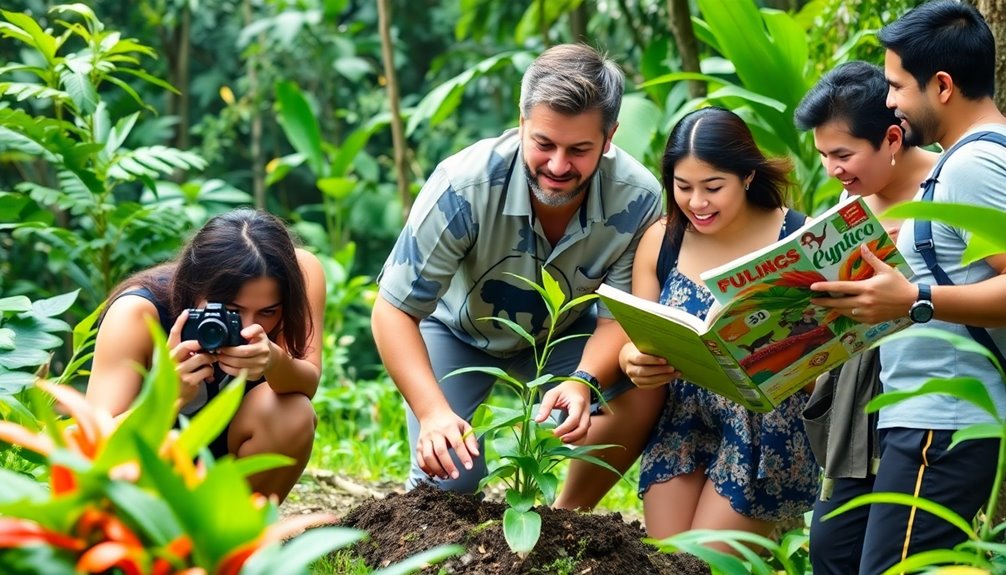When exploring eco-tourism, you'll discover three main types of eco tourists. First, adventurous eco tourists seek thrill through activities like hiking and canyoneering while supporting conservation efforts. Soft eco tourists, on the other hand, prioritize minimizing their carbon footprints by using low-carbon transport and eco-friendly accommodations. Lastly, hard eco tourists focus on immersive experiences, engaging in conservation projects that emphasize biodiversity. Each type reflects different motivations for sustainable travel, whether it's excitement, environmental consciousness, or cultural engagement. If you're curious about how these motivations shape eco-tourism, you'll uncover even more fascinating insights.
Key Takeaways
- Adventurous eco tourists seek thrilling experiences while adhering to eco-friendly practices, enhancing their travel through unique accommodations and local cultural immersion.
- Soft eco tourists prioritize sustainable practices, favoring low-carbon transport and certified eco-friendly accommodations to minimize their environmental impact.
- Hard eco tourists focus on deep environmental education and conservation, engaging in low-impact activities and community projects to promote biodiversity.
- Each type of eco tourist contributes to local economies, community empowerment, and infrastructure improvements, enhancing overall travel experiences.
- Motivations for sustainable travel include a desire for personal growth, cultural engagement, and environmental preservation, fostering a responsible exploration mindset.
Overview of Eco Tourism
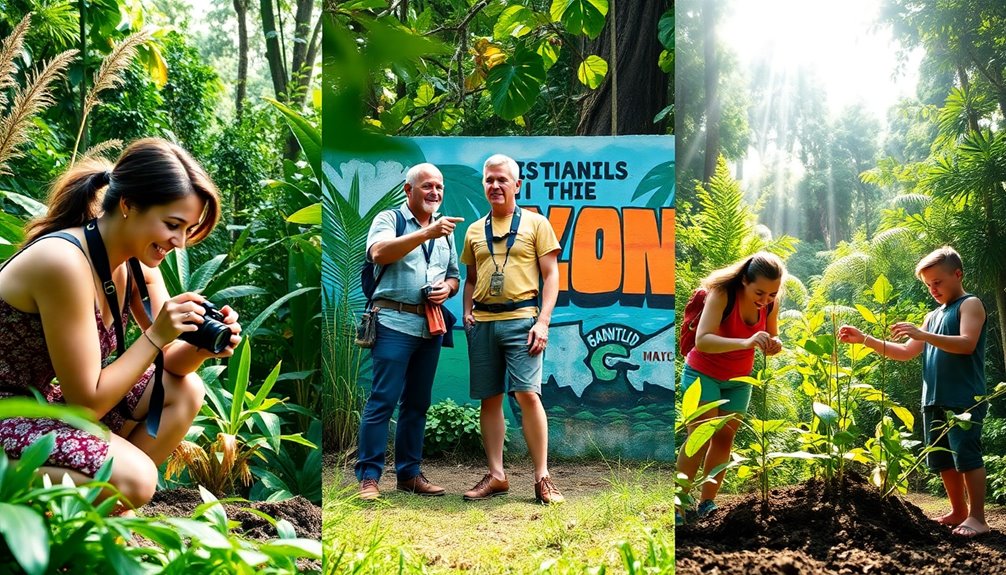
Ecotourism is more than just a travel trend; it's a responsible way to explore natural areas while supporting local communities and protecting the environment.
This form of travel focuses on minimizing impacts while maximizing benefits for both the environment and local populations. It promotes awareness and respect for cultural and natural resources, ensuring visitors have positive experiences. Conservation efforts are a key component of ecotourism, as they provide market-linked long-term solutions that protect biodiversity.
You can choose from various types of ecotourism, including nature-based experiences that connect you with wildlife, cultural immersion that engages you with local traditions, or voluntourism, where you contribute to meaningful projects.
Ultimately, ecotourism's core principles aim to enhance your understanding of nature while fostering conservation efforts and offering financial support to the communities you visit.
Adventurous Eco Tourists
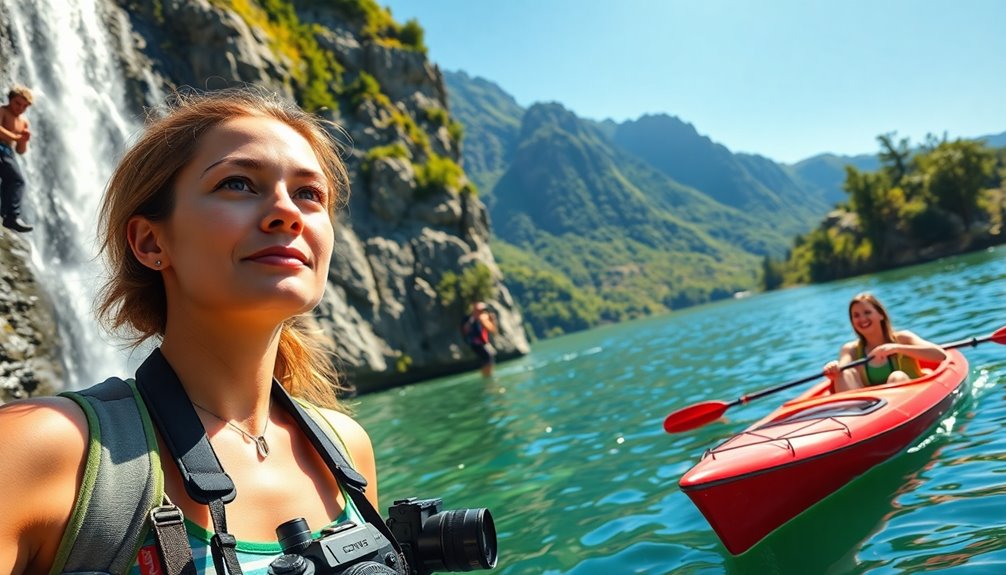
For those seeking an exhilarating experience while staying committed to eco-friendly practices, adventurous eco tourism offers the perfect blend of thrill and responsibility.
You'll engage in activities like hiking, trekking, and canyoneering, ensuring physical exertion while connecting with nature. Imagine swimming with whale sharks or exploring remote islands—each adventure deepens your respect for the environment. Ecotourism accounts for 10% of global GDP, highlighting its significance in supporting sustainable practices. Many adventurous eco tourists also seek out unique accommodations, such as hotels with water parks, to enhance their travel experience.
Cultural immersion enriches your journey, as you participate in local traditions and learn sustainable living methods.
By choosing certified eco-friendly accommodations, you support conservation efforts and promote responsible travel behavior. Embrace flexibility and open-mindedness, adapting to spontaneous experiences that foster personal growth.
Ultimately, adventurous eco tourism not only satisfies your craving for excitement but also helps protect the planet and its diverse cultures.
Soft Eco Tourists
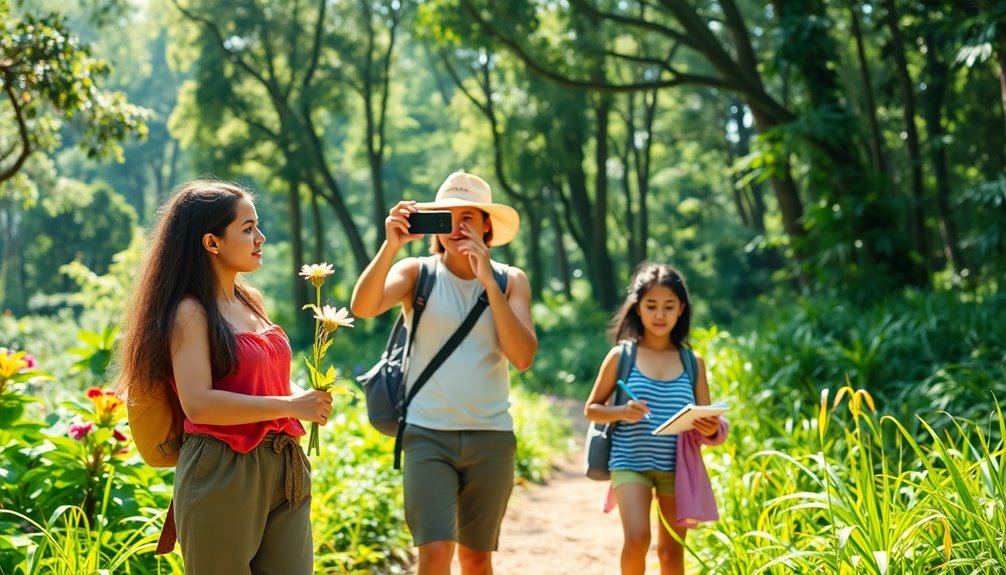
How can you explore the world while still being kind to it? As a soft eco tourist, you can prioritize sustainable travel by minimizing your carbon footprint.
Opt for trains or other low-carbon modes of transport, and choose eco-friendly accommodations with certifications like LEED. Additionally, consider staying at places that utilize heat pump technology to maintain a comfortable climate with lower energy consumption. Respect local customs by supporting small businesses and participating in community events. Engaging with local businesses not only enhances your travel experience but also supports local economies.
Engage in authentic experiences rather than mass tourism, enhancing your cultural understanding. You should also think long-term, favoring economic practices that benefit the local community.
Travel during off-peak seasons to ease the strain on resources, and consider shorter trips that reduce environmental impacts.
Hard Eco Tourists
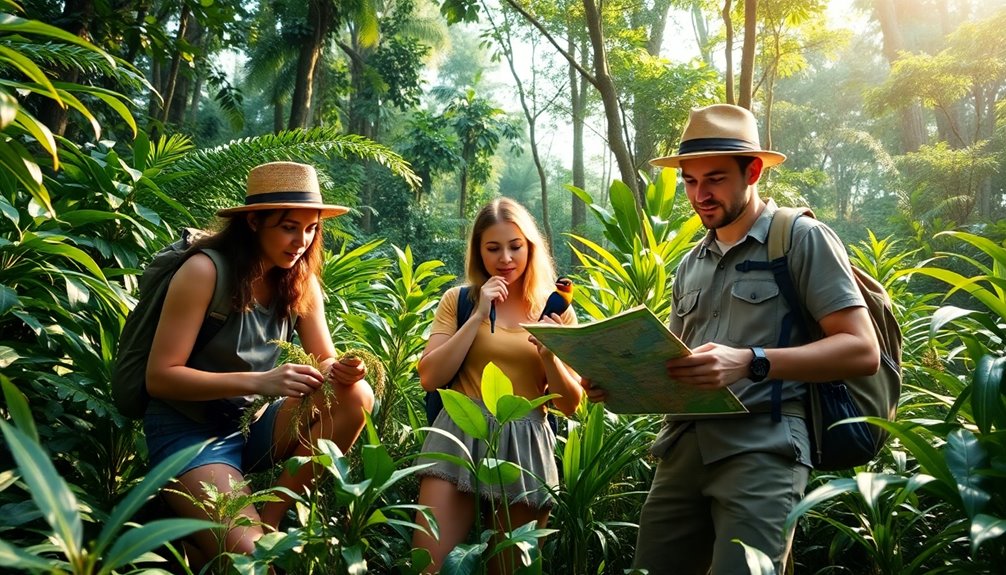
While soft eco tourists focus on gentle, low-impact travel experiences, hard eco tourists take a more immersive approach to conservation and environmental education.
You'll find that hard eco tourism emphasizes scientific interest in biodiversity, often involving rugged experiences without the comforts of hotels. Instead, you might camp at environmentally friendly sites, observing wildlife in its natural habitat.
This type of traveler shows a strong commitment to conservation, engaging in low-impact activities like hiking and participating in local community projects. You'll also attend workshops to enhance your understanding of the environment. Hard ecotourism often lacks amenities, pushing travelers to adapt and appreciate the raw beauty of nature in a more authentic way.
However, be prepared for the physical demands and ensure compliance with local regulations to minimize your impact on delicate ecosystems.
Environmental Awareness
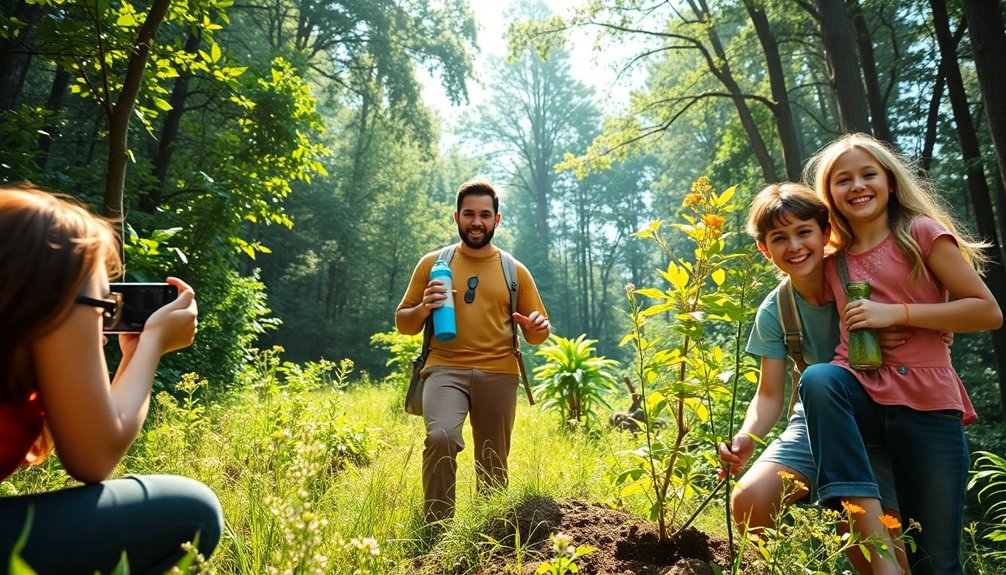
As you embark on your eco-tourism adventure, understanding environmental awareness becomes essential for making informed choices that protect our planet. This awareness focuses on conserving natural resources and promoting sustainable practices, influencing your destination choices.
When you prioritize eco-friendly spots, you support local communities and minimize your environmental impact. Your motivation often stems from a desire to contribute positively, and engaging in educational opportunities enhances your understanding of cultural and natural history.
By adopting sustainable practices—like reducing waste and participating in community initiatives—you actively boost environmental awareness. Research shows that tourists like you prefer destinations with strong environmental management, reflecting a commitment to sustainability. Additionally, the ecotourism system involves various stakeholders who work together to promote responsible travel and conservation efforts.
Ultimately, your choices shape the future of eco-tourism and its benefits for the planet.
Cultural Engagement
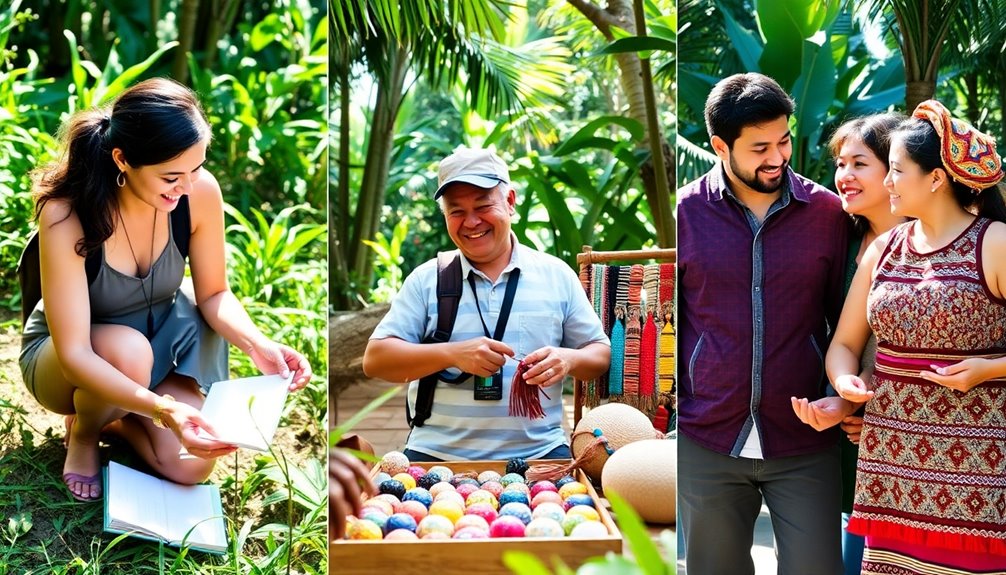
Engaging with local cultures enriches your eco-tourism experience and strengthens the bond between travelers and communities. By supporting local artisans, you help preserve crafts and empower rural and indigenous groups. Your purchases of handicrafts and participation in cultural experiences generate sustainable income, ensuring these communities maintain their traditions. Additionally, visiting historic farmhouses, such as those featured in the Top 10 historic farmhouses, offers travelers a glimpse into the architectural and cultural heritage of the region.
Moreover, financial benefits from ecotourism support local artisans, musicians, and performers, further empowering these communities economically.
As you appreciate their heritage, you inspire pride among locals, encouraging the younger generation to embrace their roots.
Ecotourism creates opportunities for visitors to participate in traditional ceremonies and workshops, allowing you to gain deeper insights into their customs. This holistic approach not only enhances your understanding but also revitalizes cultural practices at risk of fading.
Ultimately, your involvement fosters a meaningful connection that benefits both you and the community.
Personal Growth
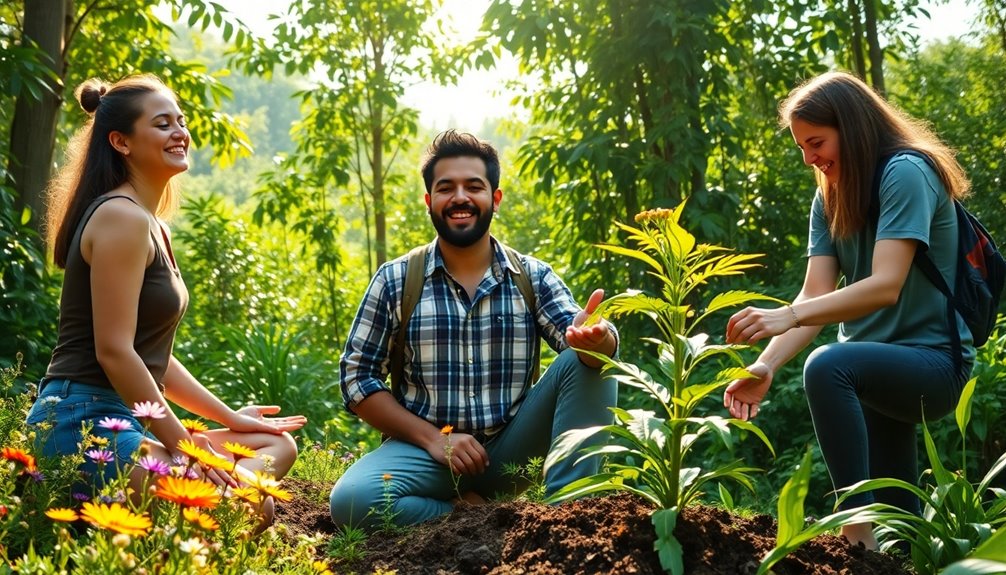
Traveling with purpose can lead to profound personal growth, transforming not just how you see the world but also how you see yourself. Engaging in wildlife observation or participating in local traditions enhances your understanding and appreciation of different cultures. As you step out of your comfort zone, you build confidence and independence, overcoming challenges that improve your problem-solving skills. With each journey, you develop a positive mindset, embracing open-mindedness and empathy toward others. This engagement also encourages you to contribute to conservation efforts, ensuring that the beauty you experience is preserved for future generations. Additionally, practicing mindfulness techniques during your travels can help you remain present and fully enjoy each moment.
Reflecting on your experiences fosters holistic development, encouraging intentional actions that make a lasting impact. Ultimately, your travels enrich your life, shaping you into a more versatile and resilient individual, ready to face whatever challenges come your way.
Economic and Community Support

Many travelers discover that eco-tourism not only enriches their experiences but also significantly supports local economies and communities.
By engaging in eco-friendly travel, you contribute to income generation through user fees, boosting regional economic development. You'll see job opportunities arise in hospitality, travel services, and local businesses, which helps reduce unemployment and promote community empowerment. In fact, tourism supported over 22 million jobs globally in 2022, showcasing its vital role in employment across various sectors.
As you participate in local initiatives, you foster cultural preservation and environmental conservation, ensuring the area's heritage and ecosystem thrive. Your involvement can also lead to infrastructure improvements, making communities more sustainable.
Frequently Asked Questions
What Are the Most Popular Eco-Tourism Destinations Worldwide?
If you're looking for popular eco-tourism destinations, consider Kenya's national parks for wildlife adventures or Costa Rica's Monteverde Cloud Forest to experience unique biodiversity.
Australia's Daintree National Park offers a glimpse into the oldest rainforest, while Brazil's Amazonian Forest showcases incredible biodiversity.
Ecuador's Yasuni National Park is perfect for birdwatching. Each destination invites you to connect with nature and embrace sustainable travel while exploring the beauty of our planet.
How Can I Prepare for an Eco-Tourism Trip?
To prepare for your eco-tourism trip, start by researching destinations with sustainable practices and creating a mindful itinerary.
Choose eco-friendly transportation, and select accommodations certified for sustainability.
Pack essentials like a reusable water bottle and eco-friendly toiletries.
Minimize single-use plastics and support local businesses during your travels.
Respect local customs and participate in green initiatives to make a positive impact.
Enjoy your adventure while preserving the environment for future generations!
What Is the Cost Comparison Between Eco-Tourism and Traditional Tourism?
Did you know that domestic eco-tourism trips average around $581 for four nights?
In comparison, traditional tourism can hit $1,558 for just seven nights. Eco-tourism often uses local transportation and budget-friendly accommodations, making it generally more affordable.
You'll find that dining locally is cheaper too, averaging just $58 a day.
Choosing eco-tourism not only saves you money, but it also supports sustainable practices while you enjoy your travels.
Are There Certifications for Eco-Friendly Accommodations?
Yes, there are several certifications for eco-friendly accommodations you should know about.
Green Key Certification, for instance, recognizes over 6,000 establishments globally that meet strict environmental standards.
Ecobnb promotes sustainability through a self-certification process.
Other notable certifications include GSTC, EarthCheck, and Ecostars, each with unique evaluation criteria.
These certifications help you choose accommodations that prioritize sustainability, ensuring your travel aligns with your eco-friendly values.
How Can I Ensure My Travel Choices Are Truly Sustainable?
To ensure your travel choices are truly sustainable, start by minimizing waste—carry reusable items and avoid single-use plastics.
Choose eco-friendly accommodations with certifications and support local communities.
Opt for sustainable transportation like trains or buses, and consider carbon offsets.
Engage in responsible activities by eating locally, supporting local businesses, and respecting local cultures.
Lastly, participate in conservation efforts to make a positive impact on the places you visit.
Conclusion
In conclusion, understanding the three types of eco tourists—adventurous, soft, and hard—reveals the diverse motivations behind sustainable travel. While some might argue that eco tourism can disrupt local ecosystems, it's essential to recognize that when done thoughtfully, it fosters environmental awareness, cultural engagement, and personal growth. By supporting local economies, eco tourists can leave a positive impact, ensuring that both travelers and communities thrive while preserving the planet for future generations. So, embrace your eco-friendly journey!

